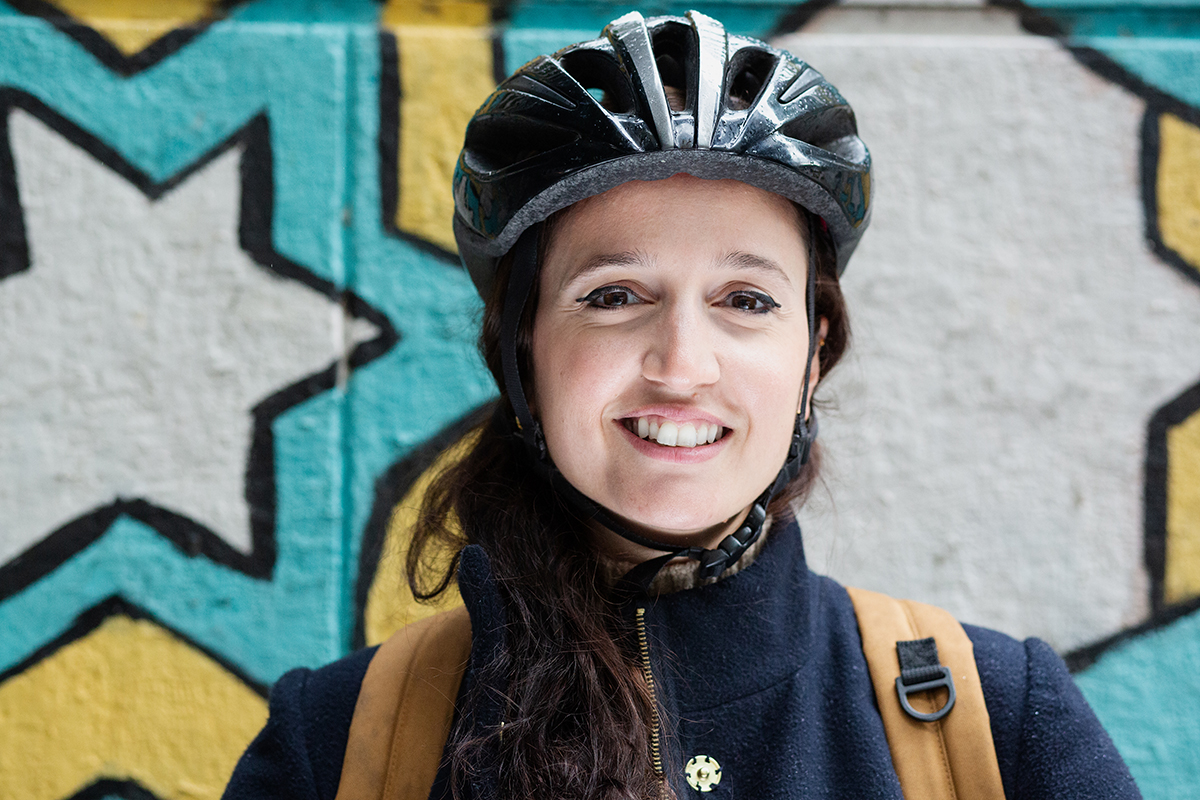Nadida Raad: “Let us work on creating a cycling culture in Lebanon”
Date:
Nadida Raad, 34, is co-founder of The Chain Effect, a non-profit organization that promotes the use of the bicycle as a means of transport in Lebanon through street art, public interventions, community projects and city planning. The Chain Effect also addresses the ever-growing problem of mobility and lack of public spaces. Over the past years, their “Bike to Work” events have gathered hundreds of participants.

When Nadida moved to Beirut from Tripoli in 2008 to pursue her master’s degree in electrical and computer engineering, she did not realize she would embark on an exciting journey to promote cycling. “Commuting in Beirut can be very challenging,” she said, “roads are constantly congested with traffic and public transport is not reliable. I remember one day, I had to pick up a package from downtown Beirut. I cycled there, as it was faster and easier. It was the first time I used the bicycle to commute, so I didn’t have a lock with me. When I arrived at my destination, a store owner gladly accepted to watch my bicycle. You would be surprised to see how supportive people are when they see you commuting by bicycle.”
Nadida spent years encouraging others around her to switch to cycling. When she met Zeina Hawa and Elena Haddad, she was ready to take it to the next level. Together they co-founded The Chain Effect, in 2014, a non-governmental organization that was legally registered in 2019. Nadida explained that The Chain Effect was initially Zeina and Elena’s idea to promote cycling through art. “Having both studied in Europe where they commuted by bike, they wanted to introduce the same concept to Lebanon,” she added.
Nadida notes that The Chain Effect uses street art to start a conversation about cycling in the city. Zeina and Elena drew their first mural in Ain Mraysse that read: “If you rode a bicycle you’d be there by now”. The mural was completed a few days before the Beirut Marathon took place, and it received a lot of attention from runners who passed by it.
The team of the Chain Effect is very much passionate about what they do. Nadida explains, “we all have full-time jobs and juggle our work and volunteering with The Chain Effect. During the past few years, my working day would sometimes end around 8 pm, but my commitment to The Chain Effect’s cause was so strong that I would wake up at 5am, cycle my way to a new location to paint a mural with my teammates, go back home by 7 am, shower, get dressed and go to work. We were making a difference and I’m truly proud to be part of this adventure.”
Two hundred people joined the NGO’s first edition of Bike to Work in 2017, a yearly event during which residents of Beirut, Tripoli and other cities are encouraged to use their bicycles, instead of cars, to go to work. “Several bike shop owners offered free bike rentals to participants for the day, and coffeeshops contributed by serving free coffee and snacks, while we covered the costs of ad-printing ourselves,” she said.
The following year, the Lebanese American University (LAU) funded the event and disseminated the invitation to students, 650 participants showed up. “For our last Bike to Work event in 2019, we partnered again with LAU and received a sponsorship from the Embassy of Switzerland in Beirut. The Minister of Environment, the mayor of Beirut, as well as several parliament members and ambassadors joined the event alongside 800 participants. It was a successful event that caught the attention of national TV stations,” she added. “It was really beautiful seeing so many people in Beirut moving around by bike… and we were very much looking forward for upcoming editions but unfortunately the event could not be organized because of the COVID-19 pandemic and the current economic crisis in Lebanon.”
The Chain Effect believes local businesses can help boost cycling. “We met with many companies and pitched the “Bike to Work” idea and asked them to encourage their staff to commute to work- by providing secure bicycle parking, lockers, and put in place showers - A number of these companies got excited and sent emails to their employees encouraging them to take part, others dismissed us or told us that the staff would come all sweaty to work. Several business owners believed the idea to be a waste of time and money”, Nadida said.
“Creating a cycling culture, requires involvement of the community; and children are part of this community; they are the future; therefore, our work involves giving workshops to kids. We worked with many NGOs that empower and educate children to become better citizens, by teaching them how to ride bicycles, how to inflate and fix tires, by painting bicycle related murals with them in their own neighborhoods. This creates a sense of responsibility and care between the kids and their environment.”
Nadida believes that Lebanon needs better urban plans, better public transportation as well as bicycle-friendly, disability-friendly and environmentally friendly streets.
“Moreover, we need to create a public demand for bicycle-friendly infrastructure - providing more bike lanes, or dedicated bike paths separated from both road and sidewalk - by encouraging cycling as an alternate means of transportation. Only then the authorities and cities would develop urban plans that would acknowledge bikers,” she said
Nadida is aware of the climate change challenges. “What sort of world are we bringing children into?” she asked. “We must start the change, individually. We need to act now before it is too late. Let us refrain from throwing a napkin out of a car window, let us pay attention to our use of plastic bags - I always carry around my tote bag and I recycle – let us adopt and promote environmentally friendly commute options, such as walking (when possible), cycling, using the bus or even carpooling.”